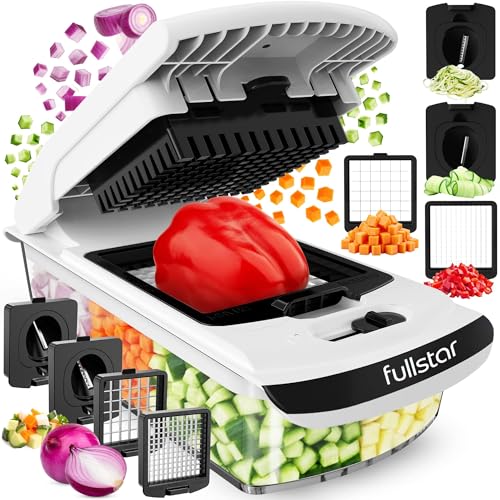Chess Pie Origins
The origins of chess pie, a classic Southern dessert, remain shrouded in mystery and debate among culinary historians.
Its Southern Roots trace back to early American settlements, where simple ingredients defined recipes.
Historical Myths suggest connections to English tarts or mispronunciations of “cheese pie,” yet no definitive evidence exists, leaving scholars to ponder the true genesis of this enigmatic, custardy creation.
- The Original Pro Chopper - Our superstar veggie slicer has been creating waves on TikTok! Simple to use,...
- Easy Meal Prep with Rust-Resistant Blades - Our vegetable chopper is perfect for anyone who wants to eat...
- 5-Star Design - The soft-grip TPU handle ensures controlled chopping, while the non-skid rubber base...
Dessert Lovers
Enthusiasts of sweet treats often find themselves captivated by the allure of chess pie, a dessert that marries simplicity with indulgence.
Among dessert lovers, it holds a special place within Dessert Trends, celebrated for its nostalgic charm.
At Baking Events, aficionados gather to explore its rich heritage, sharing recipes and techniques that highlight its enduring appeal in the ever-evolving world of sweets.
- Makes Everything Simple : Just forget your bagged cheese! Only turn the handle for several times and get...
- Premium Material : All parts of the rotary cheese grater are made of food grade ABS material, no BPA. The...
- Three Option Grater : The parmesan cheese grater finishes food preparation with slicing, shredding and...
Essential Ingredients

Observers of culinary traditions note that the charm of chess pie lies not only in its historical allure but also in the carefully selected components that define its character.
Core ingredients like eggs, sugar, and butter require Ethical Sourcing to ensure quality and sustainability.
Proper Storage Methods, such as refrigeration for perishables, preserve freshness and maintain the pie’s distinct, rich flavor profile.
- 💰 REDUCE WASTE AND SAVE MONEY: Chef Preserve keeps FOOD FRESH 5 TIMES LONGER than non-vacuum storage...
- ✅ POWERFUL, QUICK & EASY TO USE: Simply press the button to start. The device vacuum seals a bag in 5...
- ♻️ REUSABLE & RESEALABLE BAGS: Chef Preserve comes with dishwasher, freezer, refrigerator, and...
Cooking Steps
Crafting a chess pie demands precision and attention to detail in every stage of preparation.
Meticulous ingredient sourcing ensures quality, as fresh, high-grade components elevate the final dish.
Measuring and mixing require accuracy to achieve the signature texture.
Kitchen safety is paramount—sharp tools and hot surfaces necessitate caution to prevent mishaps during this delicate process of creating a classic dessert.
- Generous Capacity: 7-quart slow cooker that comfortably serves 9+ people or fits a 7-pound roast
- Cooking Flexibility: High or low slow cooking settings, with convenient warm function for ideal serving...
- Convenient: Set it and forget it feature enables you to cook while at work or performing daily tasks
1. Preheat Oven Now

With the ingredients measured and mixed, the next step in crafting a chess pie involves preparing the oven for baking.
Preheating to the correct temperature, typically 350°F, ensures even cooking.
Attention to oven safety is crucial; keep the area clear of flammable items.
For energy efficiency, avoid opening the door unnecessarily during preheating, preserving heat and reducing energy waste during this critical phase.
- 100% Leak-proof: Guaranteed no-spill seal and secure latches
- Crystal-clear Tritan Built: Stain-resistant and odor-resistant material for a clear view of contents
- Lightweight & Sturdy: Easy to carry, yet durable for everyday use
2. Mix Pie Filling

Begin by combining the core ingredients for the chess pie filling in a large mixing bowl to achieve a smooth, uniform consistency.
Through experimental mixing, one can ensure even distribution of sugar, eggs, and butter.
Innovative blending techniques help emulsify the components, creating a cohesive texture.
This meticulous process is crucial for the filling’s signature richness and sets the foundation for baking success.
- 𝗘𝗳𝗳𝗼𝗿𝘁𝗹𝗲𝘀𝘀 𝗪𝗲𝗶𝗴𝗵𝗶𝗻𝗴: Supports 5 units...
- 𝗣𝗿𝗲𝗰𝗶𝘀𝗲 𝗥𝗲𝘀𝘂𝗹𝘁𝘀: Accurately weighs up to 11 lb/5 kg with 1 g...
- 𝗦𝗶𝗺𝗽𝗹𝗲 & 𝗖𝗼𝗺𝗽𝗮𝗰𝘁: The small and sleek scale is a perfect fit for...
3. Pour Into Pie Crust

Transferring the prepared chess pie filling into the pie crust marks a pivotal step in the baking process.
The Flow Technique ensures a smooth, even distribution, preventing air bubbles or spills.
This Container Art requires precision, as the filling must settle uniformly within the crust’s edges, maintaining structural integrity and aesthetic appeal for the traditional dessert’s signature look and texture.
- Instant Read Food Thermometer | Our instant read thermometer features a temperature probe and advanced,...
- Multi-Use | From bbq thermometer to baking thermometer, our digital food thermometer for cooking is...
- Easy-Read Digital Thermometer For Cooking | Large instant thermometer dial with bright blue backlight...
4. Bake Pie Golden

Placing the filled pie crust into a preheated oven initiates the crucial baking phase for achieving the iconic golden hue of a chess pie.
Baking Science reveals that consistent heat, often at 350°F, caramelizes sugars, creating the Golden Aesthetics.
Monitoring the pie for 40-50 minutes ensures the top transforms into a glossy, amber crust, signaling perfection without overbaking the delicate filling.
- Versatile 54-Piece Collection: Elevate your kitchen with the Home Hero 54-Piece Kitchen Utensil Set, a...
- Durable and Long-Lasting: Crafted from premium stainless steel, these kitchen utensils are designed to...
- Perfect Holiday Gift: Delight your loved ones with this kitchen utensils gift set this festive season....
5. Cool Pie Completely

After achieving the desired golden crust through careful baking, the chess pie must undergo a vital cooling process to set its texture and enhance its flavors.
Various Cooling Methods, such as resting at room temperature or refrigerating, influence the outcome.
Temperature Effects are significant, as gradual cooling prevents cracking and ensures a smooth, custardy consistency, preserving the pie’s structural integrity and taste.
- 24-ounce insulated stainless-steel water bottle with a FreeSip spout and push-button lid with lock
- Patented FreeSip spout designed for either sipping upright through the built-in straw or tilting back to...
- Protective push-to-open lid keeps spout clean; convenient carry loop doubles as a lock
6. Slice Pie Neatly

Once the chess pie has cooled completely, achieving a neat slice becomes essential to maintain its aesthetic appeal and structural integrity.
Using a sharp, warmed knife ensures Clean Cuts, minimizing crumbs and preserving the filling’s texture.
Wiping the blade between slices maintains Edge Perfection, presenting each piece with precision.
This meticulous approach elevates the pie’s visual allure and enhances the overall dining experience.
7. Garnish Pie Creatively

Enhancing the visual appeal of a chess pie extends beyond neat slicing to the art of creative garnishing, which can elevate its presentation significantly.
Creative Garnishes, such as whipped cream swirls or fruit arrangements, add flair.
Themed Toppings, like autumn leaves made of sugar or holiday motifs, can contextualize the pie, aligning its aesthetic with seasonal or festive occasions for memorable impact.
Serving and Pairing Suggestions

A well-served chess pie can transform a simple dessert into a memorable culinary experience through thoughtful presentation and complementary pairings.
Consider these options for Tea Pairings and Beverage Matches:
- Earl Grey Tea – Its citrus notes enhance the pie’s richness.
- Sweet Iced Tea – A Southern classic that balances sweetness.
- Coffee – Bold flavors contrast the creamy texture.
- Dessert Wine – Adds a sophisticated touch.
Tips and Variations

Crafting the perfect chess pie involves attention to detail and an openness to experimentation.
For optimal results, consider these nuanced approaches:
- Explore Freezing Methods – Freeze unbaked pie to preserve texture.
- Try Gluten Adaptations – Use almond flour for dietary needs.
- Adjust Sweetness – Balance sugar with tart elements.
- Incorporate Spices – Add nutmeg for depth and complexity.
Kitchen Tools
Preparing a chess pie with efficiency and precision requires the right kitchen tools to ensure consistent results. Proper Tool Organization streamlines the process, while Safety Measures prevent mishaps during preparation. A structured setup and caution are vital for success. Below is a detailed table outlining key tools, their uses, and associated precautions for crafting this classic dessert with accuracy and care.
| Tool | Purpose | Safety/Organization Tip |
|---|---|---|
| Mixing Bowl | Combining ingredients | Secure on counter; avoid overfilling |
| Whisk | Blending mixtures smoothly | Grip firmly; store in drawer |
| Measuring Cups | Ensuring accurate portions | Use level surfaces; keep organized |
| Pie Dish | Baking the pie evenly | Handle with mitts; store safely |
| Spatula | Spreading filling uniformly | Clean after use; avoid sharp edges |
Essential Equipment
Beyond basic kitchen tools, assembling the right equipment is crucial for mastering the delicate balance of a chess pie’s texture and flavor.
Equipment History reveals specialized pie dishes evolved for even baking.
Brand Recommendations include:
- Emile Henry – Durable ceramic pie dishes.
- Pyrex – Reliable glass for monitoring crust.
- KitchenAid – Precision mixers.
- OXO – Ergonomic measuring tools for accuracy.
Nutritional Information (Estimated, per serving)
A typical serving of chess pie offers a glimpse into its rich, calorie-dense profile, reflective of its indulgent ingredients like sugar, butter, and eggs. For Calorie Counting, the Nutrient Profile reveals high fat and sugar content. Below is an estimated breakdown per slice:
| Nutrient | Amount | % Daily Value |
|---|---|---|
| Calories | 400 | 20% |
| Total Fat | 22g | 34% |
| Sugar | 30g | 60% |
Lemon Chess Pie

Delving into the realm of Lemon Chess Pie, one encounters a vibrant variation of the classic dessert, distinguished by the addition of lemon juice and zest.
Its tangy profile intrigues, often appearing in Film Features and Literary Mentions.
Key aspects include:
- Bright citrus flavor
- Silky custard texture
- Southern heritage roots
- Cultural storytelling significance
This pie remains a captivating culinary narrative.
Troubleshooting
Exploring the practical side of crafting Chess Pie, one must address common challenges that arise during preparation and baking. System Errors, such as incorrect ingredient ratios, can lead to texture issues. Hardware Failures, like uneven oven temperatures, often cause improper baking. Identifying these problems early ensures adjustments, preventing a curdled filling or soggy crust, thus maintaining the pie’s signature consistency and flavor.
Conclusion
While the journey of crafting Chess Pie reveals both its simplicity and complexity, this classic dessert stands as a testament to the balance of tradition and technique.
In these Final Thoughts, one sees its cultural resonance and culinary finesse.
As a Project Wrapup, Chess Pie embodies historical depth and practical skill, inviting bakers to appreciate its legacy through every meticulously prepared slice.
















